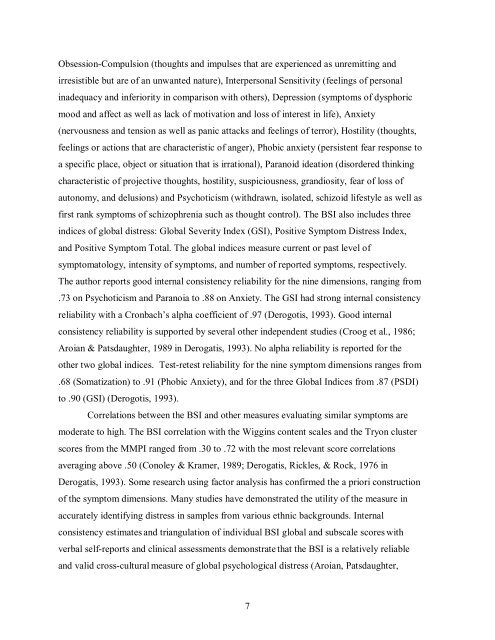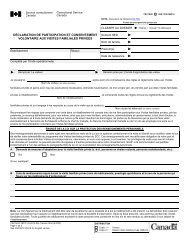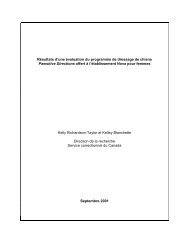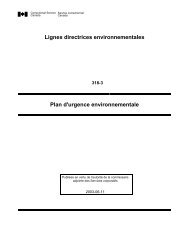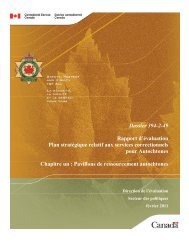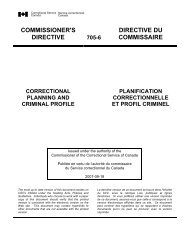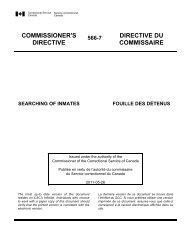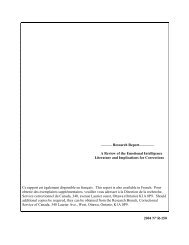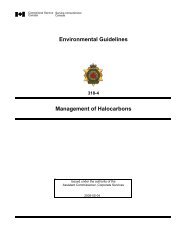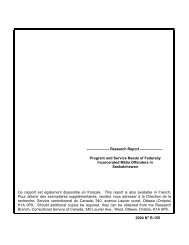The Brief Symptom Inventory (BSI) - Service correctionnel du Canada
The Brief Symptom Inventory (BSI) - Service correctionnel du Canada
The Brief Symptom Inventory (BSI) - Service correctionnel du Canada
Create successful ePaper yourself
Turn your PDF publications into a flip-book with our unique Google optimized e-Paper software.
Obsession-Compulsion (thoughts and impulses that are experienced as unremitting and<br />
irresistible but are of an unwanted nature), Interpersonal Sensitivity (feelings of personal<br />
inadequacy and inferiority in comparison with others), Depression (symptoms of dysphoric<br />
mood and affect as well as lack of motivation and loss of interest in life), Anxiety<br />
(nervousness and tension as well as panic attacks and feelings of terror), Hostility (thoughts,<br />
feelings or actions that are characteristic of anger), Phobic anxiety (persistent fear response to<br />
a specific place, object or situation that is irrational), Paranoid ideation (disordered thinking<br />
characteristic of projective thoughts, hostility, suspiciousness, grandiosity, fear of loss of<br />
autonomy, and delusions) and Psychoticism (withdrawn, isolated, schizoid lifestyle as well as<br />
first rank symptoms of schizophrenia such as thought control). <strong>The</strong> <strong>BSI</strong> also includes three<br />
indices of global distress: Global Severity Index (GSI), Positive <strong>Symptom</strong> Distress Index,<br />
and Positive <strong>Symptom</strong> Total. <strong>The</strong> global indices measure current or past level of<br />
symptomatology, intensity of symptoms, and number of reported symptoms, respectively.<br />
<strong>The</strong> author reports good internal consistency reliability for the nine dimensions, ranging from<br />
.73 on Psychoticism and Paranoia to .88 on Anxiety. <strong>The</strong> GSI had strong internal consistency<br />
reliability with a Cronbach’s alpha coefficient of .97 (Derogotis, 1993). Good internal<br />
consistency reliability is supported by several other independent studies (Croog et al., 1986;<br />
Aroian & Patsdaughter, 1989 in Derogatis, 1993). No alpha reliability is reported for the<br />
other two global indices. Test-retest reliability for the nine symptom dimensions ranges from<br />
.68 (Somatization) to .91 (Phobic Anxiety), and for the three Global Indices from .87 (PSDI)<br />
to .90 (GSI) (Derogotis, 1993).<br />
Correlations between the <strong>BSI</strong> and other measures evaluating similar symptoms are<br />
moderate to high. <strong>The</strong> <strong>BSI</strong> correlation with the Wiggins content scales and the Tryon cluster<br />
scores from the MMPI ranged from .30 to .72 with the most relevant score correlations<br />
averaging above .50 (Conoley & Kramer, 1989; Derogatis, Rickles, & Rock, 1976 in<br />
Derogatis, 1993). Some research using factor analysis has confirmed the a priori construction<br />
of the symptom dimensions. Many studies have demonstrated the utility of the measure in<br />
accurately identifying distress in samples from various ethnic backgrounds. Internal<br />
consistency estimates and triangulation of indivi<strong>du</strong>al <strong>BSI</strong> global and subscale scores with<br />
verbal self-reports and clinical assessments demonstrate that the <strong>BSI</strong> is a relatively reliable<br />
and valid cross-cultural measure of global psychological distress (Aroian, Patsdaughter,<br />
7


